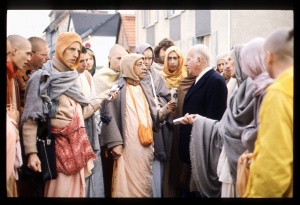CC Madhya 8.66 (1975): Difference between revisions
(Vanibot #0027: CCMirror - Mirror CC's 1996 edition to form a basis for 1975) |
(Vanibot #0020: VersionCompareLinker - added a link to the Version Compare feature) |
||
| Line 2: | Line 2: | ||
<div style="float:left">'''[[Sri Caitanya-caritamrta (1975)|Śrī Caitanya-caritāmṛta (1975)]] - [[CC Madhya (1975)|Madhya-līlā]] - [[CC Madhya 8 (1975)|Chapter 8: Talks Between Śrī Caitanya Mahāprabhu and Rāmānanda Rāya]]'''</div> | <div style="float:left">'''[[Sri Caitanya-caritamrta (1975)|Śrī Caitanya-caritāmṛta (1975)]] - [[CC Madhya (1975)|Madhya-līlā]] - [[CC Madhya 8 (1975)|Chapter 8: Talks Between Śrī Caitanya Mahāprabhu and Rāmānanda Rāya]]'''</div> | ||
<div style="float:right">[[File:Go-previous.png|link=CC Madhya 8.65 (1975)|Madhya-līlā 8.65]] '''[[CC Madhya 8.65 (1975)|Madhya-līlā 8.65]] - [[CC Madhya 8.67 (1975)|Madhya-līlā 8.67]]''' [[File:Go-next.png|link=CC Madhya 8.67 (1975)|Madhya-līlā 8.67]]</div> | <div style="float:right">[[File:Go-previous.png|link=CC Madhya 8.65 (1975)|Madhya-līlā 8.65]] '''[[CC Madhya 8.65 (1975)|Madhya-līlā 8.65]] - [[CC Madhya 8.67 (1975)|Madhya-līlā 8.67]]''' [[File:Go-next.png|link=CC Madhya 8.67 (1975)|Madhya-līlā 8.67]]</div> | ||
{{CompareVersions|CC|Madhya 8.66|CC 1975|CC 1996}} | |||
{{RandomImage}} | {{RandomImage}} | ||
==== TEXT 66 ==== | ==== TEXT 66 ==== | ||
<div class="verse"> | <div class="verse"> | ||
:prabhu kahe, | :prabhu kahe,--"eho bāhya, āge kaha āra" | ||
:rāya kahe, | :rāya kahe,--"jñāna-śūnyā bhakti--sādhya-sāra" | ||
</div> | </div> | ||
| Line 25: | Line 24: | ||
<div class="translation"> | <div class="translation"> | ||
After hearing this, the Lord, as usual, rejected it, considering it to be external devotional service. He again asked Rāmānanda Rāya to speak further, and Rāmānanda Rāya replied, | After hearing this, the Lord, as usual, rejected it, considering it to be external devotional service. He again asked Rāmānanda Rāya to speak further, and Rāmānanda Rāya replied, "Pure devotional service without any touch of speculative knowledge is the essence of perfection." | ||
</div> | </div> | ||
| Line 32: | Line 31: | ||
<div class="purport"> | <div class="purport"> | ||
Śrīla Bhaktisiddhānta Sarasvatī Ṭhākura in his Anubhāṣya commentary says that this stage-devotional service mixed with speculative knowledge-is also external and not within the jurisdiction of pure devotional service as practiced in Vaikuṇṭhaloka. As soon as there is some conception of materialistic thought-be it positive or negative-the service is not spiritual. It may be free from material contamination, but because there is mental speculation the devotional service is not pure and freed from the contamination of material life. A living entity who wants to be completely pure must be above this material conception. The negation of material existence does not necessarily mean spiritual existence. After material existence is negated, spiritual existence-namely sac-cid-ānanda-still may not be manifest. Until one comes to the stage of actually understanding one's eternal relationship with the Supreme Lord, he cannot enter into spiritual life. Spiritual life means becoming detached from material life and engaging in the loving service of the Lord. Śrī Caitanya Mahāprabhu therefore asked Rāmānanda Rāya to explain something transcendental to devotional service mixed with speculative knowledge. A pure devotee is completely surrendered to the lotus feet of the Lord, and only by his love does he conquer Kṛṣṇa, who cannot be conquered by anyone. Kṛṣṇa always stands victorious over everything. No one can conquer Him. One can attain the stage of pure devotion simply by fully surrendering. This is next corroborated by Śrīmad-Bhāgavatam ([[SB 10.14.3|10.14.3]]), wherein Lord Brahmā, defeated by the potency of Śrī Kṛṣṇa, fully surrendered unto the Lord. | |||
</div> | </div> | ||
Latest revision as of 20:23, 27 January 2020

A.C. Bhaktivedanta Swami Prabhupada
TEXT 66
- prabhu kahe,--"eho bāhya, āge kaha āra"
- rāya kahe,--"jñāna-śūnyā bhakti--sādhya-sāra"
SYNONYMS
prabhu kahe—the Lord said; eho—this; bāhya—external; āge—ahead; kaha—speak; āra—further; rāya kahe—Rāmānanda Rāya replied; jñāna-śūnyā bhakti—devotional service independent of logic and empiric philosophy; sādhya-sāra—the essence of the perfection of life.
TRANSLATION
After hearing this, the Lord, as usual, rejected it, considering it to be external devotional service. He again asked Rāmānanda Rāya to speak further, and Rāmānanda Rāya replied, "Pure devotional service without any touch of speculative knowledge is the essence of perfection."
PURPORT
Śrīla Bhaktisiddhānta Sarasvatī Ṭhākura in his Anubhāṣya commentary says that this stage-devotional service mixed with speculative knowledge-is also external and not within the jurisdiction of pure devotional service as practiced in Vaikuṇṭhaloka. As soon as there is some conception of materialistic thought-be it positive or negative-the service is not spiritual. It may be free from material contamination, but because there is mental speculation the devotional service is not pure and freed from the contamination of material life. A living entity who wants to be completely pure must be above this material conception. The negation of material existence does not necessarily mean spiritual existence. After material existence is negated, spiritual existence-namely sac-cid-ānanda-still may not be manifest. Until one comes to the stage of actually understanding one's eternal relationship with the Supreme Lord, he cannot enter into spiritual life. Spiritual life means becoming detached from material life and engaging in the loving service of the Lord. Śrī Caitanya Mahāprabhu therefore asked Rāmānanda Rāya to explain something transcendental to devotional service mixed with speculative knowledge. A pure devotee is completely surrendered to the lotus feet of the Lord, and only by his love does he conquer Kṛṣṇa, who cannot be conquered by anyone. Kṛṣṇa always stands victorious over everything. No one can conquer Him. One can attain the stage of pure devotion simply by fully surrendering. This is next corroborated by Śrīmad-Bhāgavatam (10.14.3), wherein Lord Brahmā, defeated by the potency of Śrī Kṛṣṇa, fully surrendered unto the Lord.